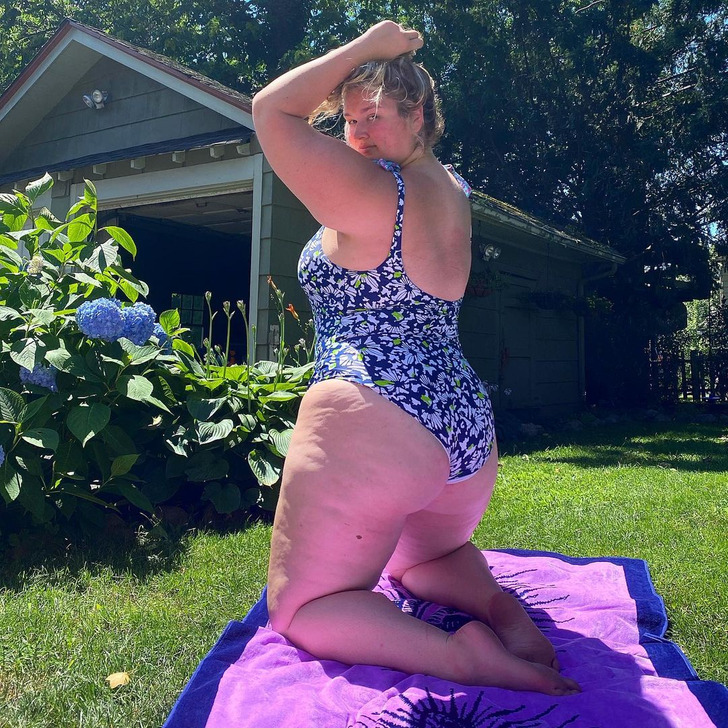Hunter McGrady is known as Sports Illustrated Swimsuit’s “curviest model ever.” But this milestone and other achievements weren’t enough to keep haters away. Now, she speaks about how she deals with them.
Meet Hunter McGrady.
Hunter McGrady is an American model and body positivity advocate renowned for her work in the fashion industry. Her breakthrough moment came in 2017. She was selected through an open casting call to appear in the Sports Illustrated Swimsuit Issue, making her debut as one of the magazine’s curviest models ever. This achievement marked a significant step in her career and highlighted her commitment to challenging conventional beauty standards.
McGrady’s influence extends beyond modeling. She is a vocal advocate for mental health, self-love, and body diversity. Through interviews, social media, and public appearances, she encourages people to embrace their bodies and reject unrealistic societal expectations.
The pivotal moment of her life.

McGrady’s career began as a model at the age of 15, during which she faced significant pressure to maintain a size two, leading to personal struggles with body image and self-acceptance. In a recent interview, she remembered that once she grasped the fact that being a slim fit wasn’t going to be her journey, she let herself live and be happy. Over time, she transitioned to plus-size modeling, finding her niche and voice in promoting body positivity and inclusivity within the fashion world.
It wasn’t an easy journey.

The Los Angeles native admitted that the road to acceptance was long, but therapy played a crucial role in her journey to self-love. She emphasized the importance of appreciating what our bodies can do rather than focusing on societal pressures to look a certain way.
“I think what Sports Illustrated is doing — celebrating all bodies — is so powerful. They’re doing the work. Especially right now when we’re entering this weird era, celebrating thinness,” McGrady noted.
But she keeps receiving negative comments about her body.

“No matter what you do, you’re going to get hate,” McGrady shrugged. “But you’re also going to get love. Negative comments or anybody who shames someone about their body? That’s so boring. Get something better to talk about.”
She emphasizes that criticism and negativity are inevitable, but so is support and appreciation. For McGrady, the act of body-shaming is tiresome and unproductive, reflecting more on the critic than the person being targeted. She encourages people to find more meaningful and positive topics of discussion, shifting focus away from superficial judgments.
Her message to plus-sized women.

McGrady stresses that self-love is the foundation of true confidence and resilience. Despite setbacks and challenges, the continuous effort to nurture self-love is crucial. Without it, external achievements and changes hold little significance.
“Confidence is not linear. It’s a climb,” she mentioned.
As the 60th-anniversary issue of Sports Illustrated Swimsuit hits newsstands, McGrady’s cover serves as a powerful reminder that beauty comes in all shapes and sizes. Through her journey and advocacy, she continues to inspire and promote a more inclusive and accepting view of beauty in the fashion industry and beyond.
Shania Twain: A Pop Star Who Overcame Adversity
The well-known Canadian singer-songwriter and best-selling female country music performer Shania Twain has an incredible tale of overcoming hardship. One of the numerous hardships she faced as a child growing up in a low-income environment was going to bed hungry. Even though she still views herself as lucky, she is now using her success to change the world.

At an early age, Twain started his path to fame. When she was eight years old, she began working at bars to support her family financially. Twain had a rough upbringing, but he has shown incredible resiliency and perseverance.
Twain suffered domestic abuse at the hands of her mother and stepfather when she was a small child. She said that her stepfather’s mindset was akin to that of Jekyll and Hyde, which made her childhood particularly difficult. Her family was often struggling financially as well; they frequently lacked the funds for basic expenses like food and rent.
Twain remembers the agony of starvation she had in school as well as the embarrassment she suffered due to her insufficient food intake. She was in a terrible condition, but she was too conceited to ask for help. She learned the value of strength and character development from this early fight.Throughout her life, Twain encountered numerous challenges, but she resisted letting them define who she was. She feels that her will to overcome her traumas and tribulations defines who she is, not the suffering and agony she went through. Twain became the strong woman she is now because of her tenacity and refusal to feel guilty about her upbringing.

When Twain’s mother and stepfather perished in an automobile accident, tragedy rocked her world. She gave up her dream of being a singer to support her younger brothers. But destiny had other ideas for her.
Twain was able to pursue a prosperous singing career because of her talent and perseverance. She has received several honors and recognitions, making her one of the most well-known musicians of all time. Many people have found inspiration in her incredible story.
Twain gives back these days by using her position and celebrity. She feeds underprivileged children and gives them a loving, safe atmosphere through her nonprofit initiative, Shania Kids Can. Twain has always been motivated to feed the underprivileged by her desire to positively impact the lives of others going through similar struggles to her own.

Twain, who lives with her family on a farm near Las Vegas, believes that she is lucky and gives thanks to God for her present situation. Despite having a challenging background, she overcome many obstacles to achieve incredible achievements and inspire hope in others.
The example set by Shania Twain’s life is the value of tenacity and using achievement for the benefit of society. Her story serves as an example for all of us, showing that we can overcome any challenge if we are nice and persistent.



Leave a Reply